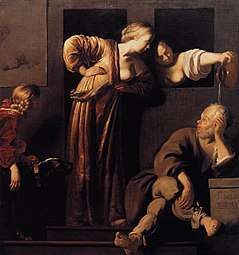Myrto
Myrto (/ˈmɜːrtoʊ/; Greek: Μυρτώ; fl. 5th century BC) was, according to some accounts, a wife of Socrates.

The original source for the claim that she was Socrates' wife appears to have been a work by Aristotle called On Being Well-Born,[1][2][3] although Plutarch expresses doubt that the work is genuine. She was apparently the daughter,[3] or, more probably, the granddaughter of Aristides.[2]
Although Diogenes Laërtius describes Myrto as Socrates' second wife living alongside Xanthippe, Myrto was presumably a common-law wife,[4] and Plutarch describes Myrto as merely living "together with the sage Socrates, who had another woman but took up this one as she remained a widow due to her poverty and lacked the necessities of life."[2] Athenaeus and Diogenes Laërtius report that Hieronymus of Rhodes attempted to confirm the story by pointing to a temporary decree the Athenians passed:
For they say that the Athenians were short of men and, wishing to increase the population, passed a decree permitting a citizen to marry one Athenian woman and have children by another; and that Socrates accordingly did so.
— Diogenes Laërtius, ii. 26
Neither Plato nor Xenophon mention Myrto, and not everyone in ancient times believed the story: according to Athenaeus, Panaetius "refuted those who talk about the wives of Socrates."[1]
Notes
- Athenaeus, xiii. 555D–556A
- Plutarch, Aristides, xxvii. 3–4
- Diogenes Laërtius, ii. 26
- Luis E. Navia (1985), Socrates, the man and his philosophy, p. 78
